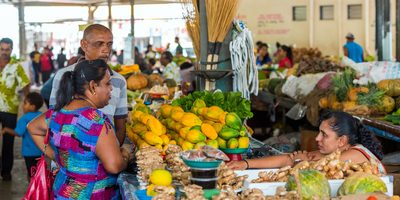
New partnership to help address burden of diabetes and hypertension in Asia-Pacific
The George Institute for Global Health will lead a new $12.5M Regional Health Partnership funded by the Australian Government to support five countries in the Pacific and Southeast Asia in strengthening the prevention, screening and management of diabetes and hypertension within their own primary health care systems.
Dr Anna Palagyi, Program Lead – Ageing & Health Systems at The George Institute, said: “It is estimated that up to 86 percent of all deaths in the region are due to non-communicable diseases, including diabetes and cardiovascular disease, with hypertension being one of the key risk factors.
“Improving a community’s access to acceptable, high-quality services for the prevention, screening and management of these conditions would have clear benefits, reducing unnecessary death and disability,” she added.
The ‘Building resilient and people-centred health systems for non-communicable disease prevention and control in Pacific and Southeast Asian countries (RESist-NCD)’ program will support partner governments and civil society organisations in Fiji, Papua New Guinea, the Philippines, Vietnam and Cambodia to improve diabetes and hypertension care.
It will also focus on strengthening essential components of the health system that are critical to maintaining diabetes and hypertension service provision at the primary health care level, such as medicines availability and the collection and use of health data for decision-making.
Importantly, the program will facilitate community-led solutions to addressing some of the root causes of chronic disease in the region, for example food and water insecurity in Fiji and Papua New Guinea, as well as ways to effectively implement policies targeting reduced sodium and sugar intake in Fiji and Vietnam.
The George Institute will work alongside consortium partners The Clinton Health Access Initiative (CHAI) and UNSW Sydney to implement the RESist-NCD program.
“The four-year program will work with partner countries to optimise the integration of diabetes and hypertension services in primary health care, and to ensure systems are in place to continually enhance and sustain these services into the future,” said Dr Palagyi.
“The George Institute, CHAI and UNSW Sydney have long-term partnerships with governments, civil society organisations and academic institutions in each of these countries, and this program is designed to address our partners’ priorities, and to strengthen and augment national and regional NCD strategies.”
The George Institute’s Guunu-maana (Heal) Aboriginal and Torres Strait Islander Health Program will contribute their extensive expertise in meaningful community engagement and partnerships to embed genuine engagement principles in the design and evaluation of the program.
Keziah Bennett-Brook, Program Head, Guunu-maana (Heal) said: “RESist-NCD recognises that community self-determination is absolutely key to equitable and sustainable improvements in health. This program seeks to centre community driven decision-making and culturally informed approaches to implementing holistic services and programs that impact upon NCDs.”
Also embedded across the program is a commitment to integrating and strengthening efforts to promote gender equality, disability and social inclusion considerations within all activities, including within the ways of working and research practices of the RESist-NCD consortium.
The RESist-NCD Regional Health Partnership is supported by the Australian Government through the Partnerships for a Healthy Region Initiative












